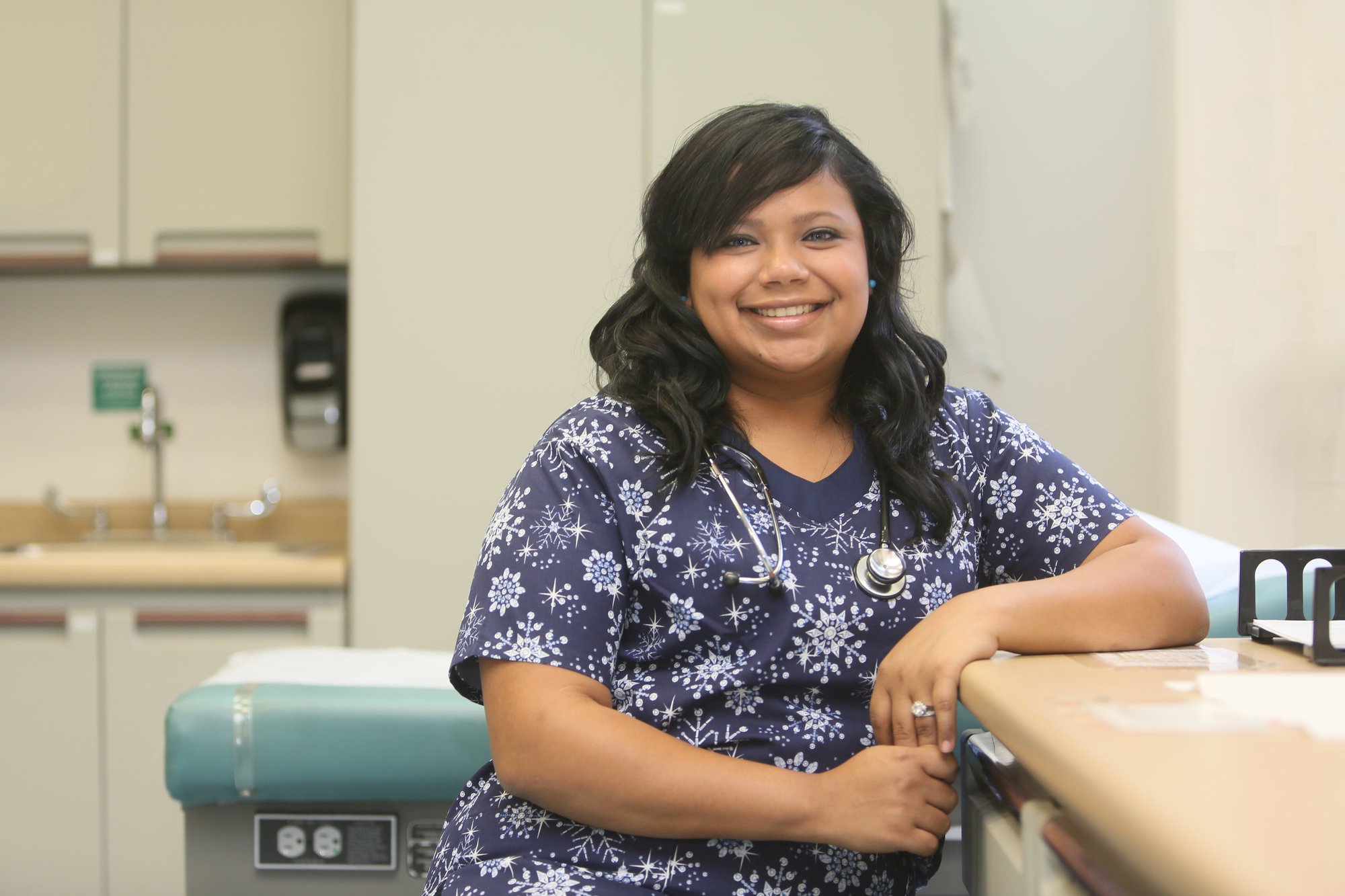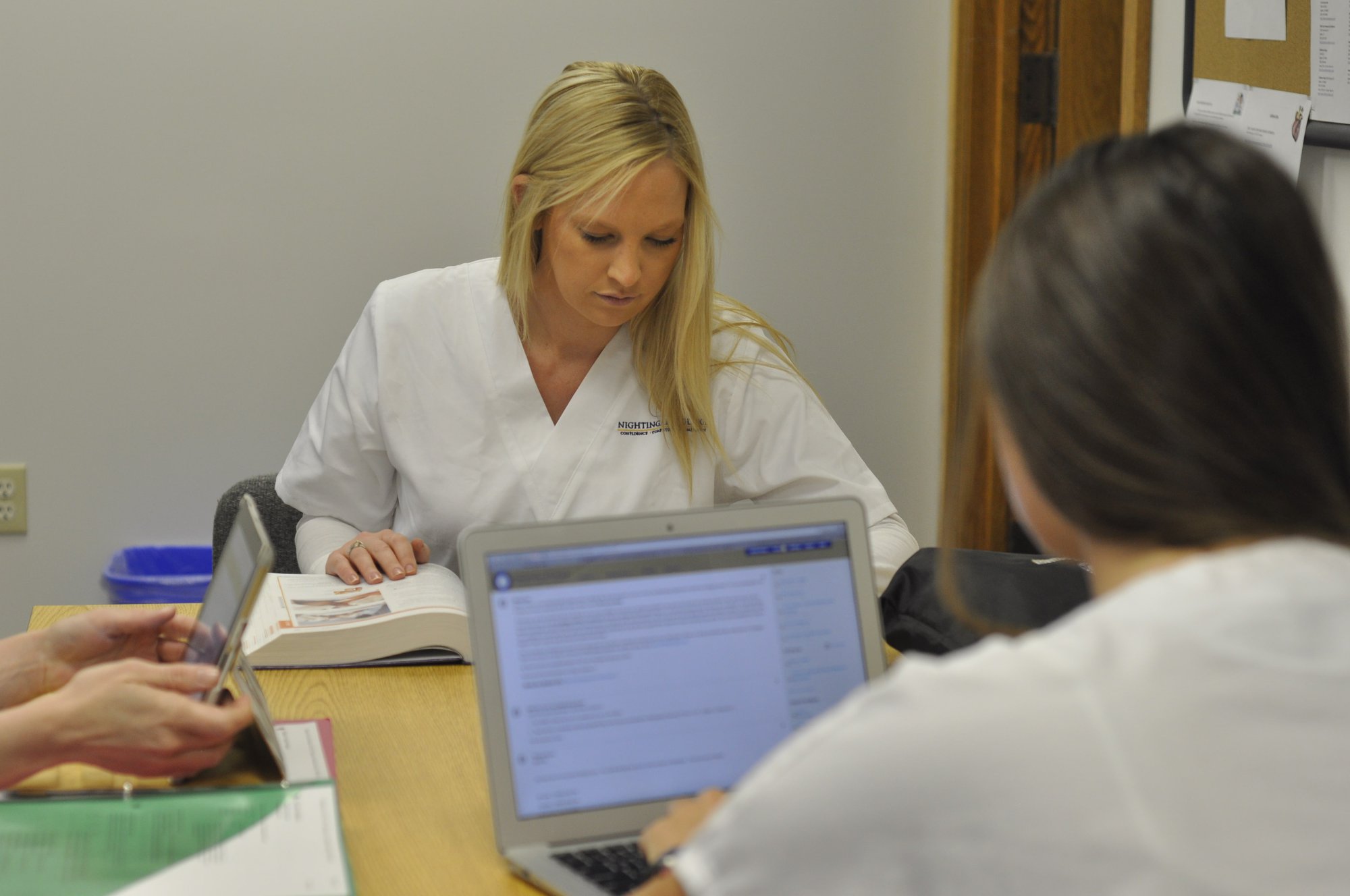MSN Degree Guide: What Is an MSN Degree & What Does It Mean for Your Nursing Career?

Earning an MSN degree can offer considerable career fulfillment and opportunities. According to the Bureau of Labor Statistics, employment for nurse practitioners alone is expected to grow by 46% throughout the decade, making the outlook for becoming an MSN nurse increasingly appealing for healthcare professionals.
Whether you’re an experienced nurse wanting more advanced roles, you plan to have a meaningful leadership role in educating future nurses, or you are merely considering the details of an MSN nurse career, it’s important to explore everything about an MSN before pursuing a degree.
What is a Master of Science in Nursing (MSN) Degree?
A Master’s Degree in Nursing (MSN) is a graduate-level nursing degree that provides opportunities for registered nurses (RNs) to advance their careers, specialize in specific areas of healthcare, and expand career opportunities.
The MSN degree qualifies you for educational, management, or administrative positions such as a nurse educator, clinical nurse specialist, director of nursing, nurse-midwife, or nurse practitioner. The program prepares nurses to work in various settings: hospitals, community agencies, schools, industry and businesses, or academic nursing programs.
What Are the Main MSN Specializations?
Most MSN degree programs also orient students toward a specific specialization that will help them find employment and excel in their chosen profession. Here are the popular specializations of an MSN nurse:
- Family nurse practitioner (FPN) – With around 70% of nurse practitioners (NPs) working as family nurse practitioners, this specialty may be the most popular option for MSN nurses. FPNs work
- Nurse educator – Focusing on teaching and training the next generation of nurses, nurse educators work in academic institutions, hospitals, and other healthcare facilities to develop curricula, teach clinical and theoretical concepts, and mentor nursing students. Discover the nurse educator salaries in the US.
- Psychiatric mental health nurse practitioner (PMHNP) – Psychiatric mental health nurse practitioners specialize in diagnosing, treating, and managing mental health conditions by providing therapy, prescribing medication, and creating care plans for patients across the lifespan in outpatient and inpatient settings.
- Certified nurse practitioner (CNP) – You need an MSN degree to become a primary care provider for patients of all ages as a nurse practitioner. This popular role among advanced-level nurses allows you to order and perform diagnostic tests, offer treatment plans, or prescribe medications in certain states.
- Nurse administrator – If you want to take on leadership roles, managing nursing staff, budgets, and policy development within healthcare organizations, nurse administration is an ideal specialization. Your work would ensure efficient, high-quality patient care while aligning with institutional goals. The role requires a combination of clinical expertise and business acumen.
- Certified nurse-midwife (CNM) – Nurse midwives specialize in pregnancy, childbirth, postpartum care, and gynecological services, working closely with expectant mothers and providing family-centered care, focusing on both the physical and emotional aspects of the birthing process. Find out more about the estimated salaries of nurse midwives.
- Research nurse – This role is very popular, but you need substantial knowledge and experience in clinical studies to research the next generation and potential health problems they might face.
- Critical care nurse – As the population ages, more people will need critical care, a top MSN specialty.
- Director of Nursing (DON) – This administrative role requires you to manage administrative tasks for nursing while establishing procedures.
- Nursing informatics – Nursing informaticians bridge the gap between patient care and technology by analyzing and optimizing healthcare information systems to improve patient outcomes, enhance workflow efficiency, and ensure data security.
- Clinical nurse specialist (CNS) – Ideal if you want to continue working directly with patients on the frontlines of care provision. Representing an expert role in evidence-based nursing practice, clinical nurse specialists work in various settings, including oncology nursing, psychiatric-mental health, pediatrics, and many others. A CNS will also proactively analyze patient outcomes and satisfaction and improve healthcare services.
MSN nurse specialties do not end here, and you can read the inspiring story of a retired Air Force Officer who became a nurse educator at Nightingale College to get an understanding of how an MSN degree can also effectively reorient your career.
It used to be that you could also become a nurse anesthetist with an MSN degree and the right specialization. However, as of 2025, nurse anesthetists require a Doctorate of Nursing Practice (DNP) to practice. Nevertheless, to advance to the doctoral level, you should consider earning your master’s since an MSN degree is a prerequisite for enrolling in a DNP program.
If you wish to complete your MSN degree education in the most flexible and accessible way, the academic programs from Nightingale College are right for you. We provide programs with three of the most popular MSN degree specializations:
- The MSN Ed program is recommended for learners who wish to work in educational positions after graduation.
- The MSN FNP program is ideal for family nurse practitioners who want to work with families and community members.
- The MSN PMHNP program is an option for aspiring psychiatric-mental health nurse practitioners.
The hybrid program can be completed within 2 years regardless of your chosen specialization. It includes online instruction, in-person seminars, and preceptorship experiences.
Browse the academic programs at Nightingale College and advance your career!

Learning Paths for an Aspiring MSN Nurse
Here are the main paths that you can embark on to earn an MSN degree, depending on your prior education and experience. Keep in mind that the admission requirements vary by specialization, institution, or program:
BSN to MSN – Shortest RN to MSN Program
If you already have your BSN and work experience, you only have to complete one-and-a-half or two years of study for a full-time MSN program, which is generally the academic choice.
This option is designed for learners who want to advance their nursing careers and specialize as nurse-midwives, nurse practitioners, nurse educators, or in other various specializations (gerontology, psychiatry, pediatrics, and so on). You can expect to take core courses in general nursing concepts (advanced health, pharmacology, physiology) and courses regarding your MSN specialty.
If you are working while studying nursing, you can choose a part-time master’s program in nursing, so be prepared to study for about three to four years.
Enroll in an online RN to MSN program and get your degree in the shortest time possible!
ADN to MSN
If you already are an RN but do not have a BSN degree, you can choose to pursue a Master’s degree from the start rather than earning a Bachelor’s degree first. This RN-to-MSN option offers an accelerated timeline for completing your studies (around three years of full-time learning) but at a more intense learning pace.
Usually, you must meet specific criteria regarding the minimum number of experiential learning hours, minimum GPA, or other scores or requirements (letters of recommendation for admission, a current RN license, etc.). You will learn BSN-level nursing courses, graduate core nursing courses, and specialization coursework typical to a BSN-to-MSN curriculum.
Non-nursing Bachelor’s to MSN
Additionally, if you have a bachelor’s degree in a non-nursing field, you can apply for an entry-level MSN program only if you meet additional prerequisite requirements. Completing this MSN option would take three or more years within a part-time study program.
You can explore each option and consider your goals, resources, and current or future responsibilities. An accredited educational facility offers the best master’s degree for nurses. It is well designed to suit their time and needs, abilities and skills, and long-term personal and professional goals.
Find out everything you need about national and regional accreditation and ensure that the institution where you pursue your Master’s Degree is accredited by the Commission on Collegiate Nursing Education (CCNE).
What Are the Admission Requirements for a Master’s in Nursing?
To enroll in an MSN program, you must have a Bachelor of Science in Nursing (BSN) from an accredited institution and have accumulated work experience in a nursing position. However, there are various educational pathways to getting an MSN degree, including bridge programs for learners who want to earn an ADN or already have an ADN-level degree.
Other requirements include GPA or GRE scores and letters of recommendation. Depending on your specialization, you may need to obtain some accreditations or pursue some prerequisite courses.
You can read our guide if you want to discover how to earn a BSN degree and qualify for advancing your education to the MSN level.
Getting an MSN Online vs. On-Campus
There are two different formats in which you can pursue an MSN degree and obtain your accreditation:
- On-campus MSN programs are held in traditional learning facilities, where students must attend theoretical and practical courses in person.
- Hybrid or online MSN programs are more flexible options that don’t require commuting to campus. Generally, theoretical learning courses are online, while the necessary practical experience is at local facilities in your proximity under professional supervision.
At Nightingale College, you can find three specialized options that prepare aspiring learners for some of the most popular MSN nurse career options via a hybrid program that combines online instruction with in-person seminars and preceptorship experiences to deliver quality education with maximum accessibility:
- The MSN Ed program is for students preparing for educational positions.
- The MSN FNP program for aspiring family nurse practitioners.
- The MSN PMHNP program for psychiatric-mental health nurse practitioners.
Browse the academic program options at Nightingale College and advance your nursing career!
How Long Does It Take to Get a Master’s Degree in Nursing?
A full-time MSN degree program takes between 2 and 3 years to complete. However, the program length depends not only on your level of education but also on your work or personal responsibilities.
- Have an ADN degree: You would need three full-time years or four part-time years of study to complete your MSN.
- Have a BSN degree: You would need to work full-time for about two or four years if you also have a job while studying.
- Have a bachelor’s degree in a non-nursing field: You would need around three full-time years of study to earn your MSNou, starting from zero. You should also consider the length of prerequisite programs, such as the program length of a BSN degree and the period of accumulating work experience.
You can learn more about how long nursing school is for different levels of accreditation from our dedicated guide.
If you want to speed up the learning process and access flexible and accessible education, you can enroll in one of the shortest RN to MSN online program options at Nightingale College:
If you enroll in any of these CCNE-accredited options, you can graduate and receive your certification to work in just 2 years. Programs consist of online instruction, one in-person seminar, and preceptorship experiences, guaranteeing top-quality education with maximum accessibility and flexibility for learners from all walks of life.
Explore all academic programs at Nightingale College!

What Will You Learn During the MSN Degree Program?
An MSN is an advanced post-graduate degree that provides the skills and advanced training for an impactful specialized role such as nurse practitioner, clinical nurse specialist, nurse educator, director of nursing, and many other meaningful roles in health care.
Since there are so many flexible options to get your MSN degree, the master’s curriculum differs from program to program, but they all have the same goal: to help you become a highly qualified ARPN (Advanced Practice Registered Nurse) in your chosen specialty
Generally speaking, there are standard courses you can learn at most MSN programs. They may include:
- Health policy and advocacy
- Clinical prevention and population health for improving health
- Leadership competencies
- Informatics and healthcare technologies
- Nursing research
- Interpersonal communication
- Evidence-based practice
- Specialty courses
MSN Nurse Job Outlook
The projected MSN nurse employment is projected to grow much faster than other occupations, healthcare-related or otherwise. According to the Bureau of Labor Statistics, the employment of nurse practitioners, nurse midwives, and nurse anesthetists is projected to grow by 40% from 2023 to 2033, much faster than that of all healthcare diagnosing or treating practitioners (9%) and 10 times higher than that of all occupations (4%), according to the. Given the changes in requirements for nurse anesthetists, we can consider the projected growth in the employment of nurse practitioners (46%) and nurse midwives (7%), which make up most of the increase.
By 2033, these sectors will have around 490,700 jobs in total, a 141,200 increase from the latest data from the BLS. Nurse practitioners will face the highest increase, amounting to 135,500 new jobs.
Responsibilities of an MSN Nurse
Getting an MSN in the medical field offers plenty of opportunities and benefits but has significant responsibilities.
Any advanced healthcare position requires you to use your clinical diagnostic and treatment expertise or your science and technology skills to manage large amounts of patient data.
You could also have a significant role as a highly qualified educator training nursing staff or specialize within a specific area like midwifery, psychiatry oncology, pediatrics, or neonatal nursing. The educational route deserves more attention because graduates can choose to become nursing school faculty because of a nationwide shortage.
Differences Between BSN and MSN Nurses
While both degrees offer opportunities to advance, there are differences between BSN and MSN nurses:
- Job opportunities: A BSN degree prepares you for entry-level practice in most hospitals and clinics, while an MSN degree provides advanced training suitable for specialized roles and nursing practice in various specialized fields and settings. For instance, an MSN nurse can fulfill educational, legal, administrative, or research roles beyond patient care.
- Career advancement: Both options can come with improvements in career opportunities and estimated salary expectations. However, advanced medical environments require MSN nurses.
- Financial resources: Additional years of studying means additional tuition fees that you should consider. If you see a lot of career prospects, the investment may be worth it.
- Time: An MSN may require more time than a BSN program. Remember that many online or bridge programs offer an accelerated timeline for graduation. If time is a concern for you, look for the shortest RN to MSN online program that is accessible.
- Level of education: An MSN program is a way of becoming highly qualified in what you already do. It is more advanced than a BSN program and usually requires nursing knowledge and work experience. If you’re an aspiring nurse without experience or a degree, getting an ADN or a BSN first would be ideal; otherwise, be prepared for an intense and challenging study program for a few years.
Find out more about the differences between a BSN and an MSN.
MSN Nurse Salary Projections
It’s essential to know that your expected MSN nurse salary depends on your chosen master’s specialty. According to the latest BLS data, nurse practitioners have a median salary of $128,490 annually, while nurse midwives make an average of $129,650 annually. The job aggregator Indeed.com reports that a clinical nurse manager makes, on average, $78,474 per year, a research nurse makes $79,610 per year, a family nurse practitioner makes $119,723 per year, while a psychiatric mental health nurse practitioner makes $137,049 per year.
Here is how the MSN nurse salary projections differ based on your prospective specialization and nursing role, according to the most recent BLS data:
|
MSN Nurse Specialization |
Annual Salary |
Hourly Wage |
|
Nurse practitioners |
$128,490 |
$61.78 |
|
Nurse midwives |
$131,570 |
$63.26 |
|
Psychiatric-mental health nurse practitioners |
$138,518 |
$58.19 |
|
Nurse educators |
$86,530 |
- |
Your expected pay grade as an MSN nurse can also vary by location. Read our study
of the nurse practitioner salaries by US state to learn more about how the payment of MSN-level nurses varies across the country.
Benefits of a Master’s Degree in Nursing: Is the Degree Worth It?
From taking a managerial, educational, or administrative role and gaining advanced knowledge of a specific area of nursing to earning a higher salary and a more meaningful career, there are plenty of benefits of an MSN. There are many reasons why aspiring or current RNs choose to complete a master’s in nursing:
- New career opportunities – Getting your MSN offers you a career with many possibilities. Thus, you have a higher chance of landing an impactful position in prestigious medical facilities or related organizations. Many healthcare settings need new leaders, managers, and nurse experts to lead or educate teams while offering the best patient outcomes. Moreover, an MSN helps you pursue your passion for helping others and focus on one type of nursing to make a difference in the long run.
- Higher salary and professional satisfaction – Gaining advanced knowledge, experience, and skills suitable for leadership, educational, or management roles comes with a better income and the chance to work with renowned institutions. Most MSN-level positions in healthcare are among the highest-paying nursing jobs. You can compare the payment estimates using our nurse salary by state report.
- Flexible and fast MSN programs to choose from – It is well known that the demand for nurses is rising, which means that the demand for APRNs is also on the rise. So it’s no surprise there are many flexible ways to learn, educate yourself, and earn an MSN degree, no matter where you are in your career.
Look at the skills and education you need to advance your nursing career.
We will explore the benefits of three of the most popular career paths for an MSN nurse and why you may choose to pursue them:
The Growing Demand for Educators: Why Choose The MSN Ed Program?
In particular, RNs who aim to become nurse educators have a higher chance of landing one of the best-paying and least stressful jobs in their careers. The current nursing faculty shortage is one of the most critical issues the nursing profession faces.
If the nursing shortage in healthcare is a serious national problem due to the aging population and professionals retiring, academia suffers even more due to a nursing faculty shortage.
At Nightingale College, you can choose the Master of Science in Nursing for Educators (MSN Ed) program, designed for BSN-prepared nurses passionate about teaching.
Supporting Underserved Communities: Why Choose The MSN FNP Program?
Due to an unequal distribution of nursing and care resources, some communities, especially rural areas, are underserved. Mitigating such crises is a priority in the industry and an opportunity to aid and support the most needy communities.
If you want to work with families and the community and provide much-needed health care on the frontlines, you should opt for the Master of Science in Nursing for Family Nurse Practitioners (MSN FNP) program.
Helping Address the National Mental Health Crisis: Why Opt for the MSN PMHNP Program?
Mental health is a crisis that needs to be addressed at the personnel allocation and patient care levels. Healthcare workers know this, considering the concerning rates of nursing burnout.
To support patients experiencing mental health issues, you should opt for the Master of Science in Nursing for Psychiatric-Mental Health Nurse Practitioner (MSN PMHNP) program.
Regardless of your choice, Nightingale College's academic programs offer flexible and accessible options for advancing your education within two years of hybrid and CCNE-accredited learning that combines online instruction, one-on-one seminars, and preceptorship experiences.
Browse our academic programs and find the best option for your future career!

